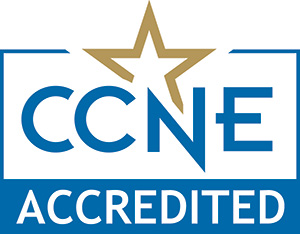School of Nursing
Mission/Goal Statement
The Western Illinois University School of Nursing’s mission is to educate future professional nurses who are clinically competent using evidence-based practice as the norm, capable of critical thinking using information and information technology to design and redesign care and care systems, and who are ethically and legally accountable for their actions on a local, national, and global basis.
Core Values
The School of Nursing core values are as follows:
- Academic excellence: we engage in a collaborative lifelong process of seeking truth and appropriating knowledge and values to transform the individual, community, and world. We value active involvement by the learner in the teaching/learning process, engaging in critical thinking, research, and creativity in a challenging learning community.
- Educational opportunity: we provide a high-quality nursing education program open to qualified students who show promise and a willingness to work toward the terminal objectives of the nursing program.
- Personal growth: we provide a program of learning that develops the whole person in an environment that supports the development of wellness, ethical decision making, and personal responsibility.
- Social responsibility: we are committed to equity, social justice, diversity, and integrity in our work with each other, the local community, and the global community.
Curriculum/Student Learning Outcomes of the Nursing Program
- As provider of care, the graduate will use building knowledge foundations, critical thinking, decision making, communication, developing values and beliefs, scientific inquiry, promoting transfer and application, and facilitating analysis, synthesis, and evaluation processes to provide ethical, evidence-based, culturally competent, reflective care that incorporates the physical, chemical and biologic, and socioeconomic-cultural dimensions of the total health experience for individuals, families, and aggregates across the life span.
- As a leader of care, the graduate will facilitate leadership through collaboration, inquiry, and advocacy to design, redesign, and coordinate safe, cost effective quality care for individuals, families and aggregates across the life span.
- As a member of the profession, the graduate will enact professional behaviors that communicate respect for their own and others values, role development, commitment of lifelong learning, promotion of social justice, and preparation for graduate education.
The Commission on Collegiate Nursing Education (CCNE) Accreditation
The baccalaureate degree in nursing program is accredited by the Commission on Collegiate Nursing Education (CCNE), 655 K Street NW, Suite 750, Washington, DC 20001, (202) 887-6791, http://www.ccneaccreditation.org.

Disclosure Statement
The accreditation procedures for baccalaureate and graduate nursing programs can be accessed at: https://www.aacnnursing.org/Portals/0/PDFs/CCNE/Procedures.pdf

Connect with WIU: